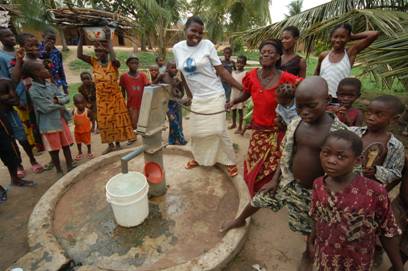When the children of Inyima in southeast Nigeria began to fall sick and die, villagers were horrified to learn that their own poor hygiene practices had contaminated the community’s drinking water, causing a deadly diarrhoea outbreak.
Three years on, Inyima, in Nigeria’s Cross River State, is one of hundreds of villages receiving help from the European Commission to improve hygiene, sanitation and access to clean drinking water.
Key to the programme’s success has been an emphasis on nurturing a sense of ownership among recipient communities.
So farming villages like Inyima have set up their own Water, Sanitation and Hygiene Committees, WASHCOMs, established to identify and manage projects and promote community ownership.
“The community is very happy, and we are even making plans for more so no one will cry from lack of water or drink from the pond again,” said farmer and WASHCOM Chairman Lawrence Elimi.
Since the erection of toilets and a clean water point, Elimi is confident the diarrhoea outbreak that killed some 17 children will not be repeated, “since then, that is a thing of the past.”
Ownership is fundamental to development effectiveness. The European Commission has developed the Backbone Strategy to implement the principles, as laid out in the 2008 Accra Action Agenda.
Though consultations began in 2003, the format and delivery of the European Commission’s Water Supply and Sanitation Sector Reform Programme in Nigeria follow the principles of that strategy. Working alongside partners, Concern Universal, a UK-based NGO, and the UN children’s agency, UNICEF, the commission has put ownership on top of the agenda.
To see and hear from the communities affected, click on the icon below:
“Ownership is the key to success. We are getting communities and civil society involved, asking them to make proposals on how water and sanitation provision can be improved,” said Ramon Reigada Granda, Head of Rural and Social Development, Water and Sanitation. “Without ownership, these projects cannot hope to be sustainable.”
That means that in communities like Inyima, villagers like Elimi are not just aid recipients, but aid participants.
To be eligible for European Commission aid, Inyima had to come together as a community to demonstrate they had the capacity to successfully take ownership of a water delivery project. Through the so-called ‘self-selection’ process they showed a willingness to commit funds and manpower to the project.
Elimi, as head of his community’s WASHCOM, then worked with his neighbours to identify what water and sanitation improvements their community needed. Together, they raised five percent of the cash and a group of willing volunteers to construct the water projects and maintain them. Villagers have been trained as volunteer hygiene promoters and they even have a small theatre troop, which acts out good hygiene practices to the hilarity of friends and neighbours.
Three years ago, the community scooped drinking water from a nearby pond and defecated in the surrounding forest without realising their actions endangered their health and the health of their children. These days, Inyima villagers have toilet blocks and a motorised water pump, which they contributed to building with their own cash and labour. They say they’re healthier as a result and are already planning what to construct next. It’s a formula being repeated across Nigeria.
Over the course of the programme, the European Commission plans to improve water supply, sanitation and hygiene promotion in up to 1,400 rural communities like Inyima and 60 small towns in six states across Nigeria. And, though much of the cost is aid from the European Commission, Nigerians are putting in their share, too. The multi-million euro budget is largely provided by the European Commission, but the Nigerian government, recipient communities and donor partners are contributing also.


(1)
Log in with your EU Login account to post or comment on the platform.
A more important achievement of EU water, sanitation and hygiene intervention in the rural communities in Nigeria, including Inyima community, is the total elimination of indiscriminate defecation in open fields and bushes in many of these villages. This has been achieved through Community-led Total Sanitation (CLTS) approach. Villagers elect to construct their toilets,without subsidy from government or donors, following awareness on the health dangers associated with unsanitary disposal of human waste.
Martin Mbonu - Nigeria